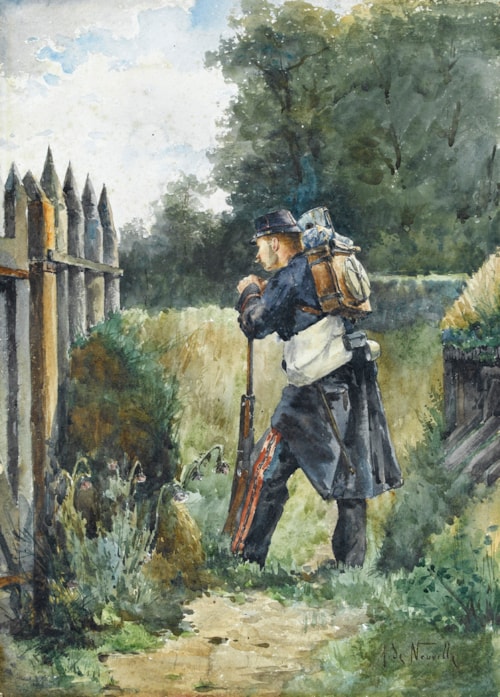
Alphonse de NEUVILLE
Saint-Omer 1835 - Paris 1885
Biography
Alphonse-Marie de Neuville was, along with Ernest Meissonier and Edouard Detaille, one of the leading military painters in France in the second half of the 19th century. At the onset of his career he worked as an illustrator, providing designs to accompany such books as Guizot’s Histoire de France. He began painting military scenes in 1858, and the following year made his Salon debut with two paintings of The Siege of Sebastopol. It was not until the outbreak of the Franco-Prussian war in 1870, however, that de Neuville came fully into his own. During the siege of Paris, the artist was attached to a unit defending the outskirts of the city at Le Bourget, and saw the action and effects of the war at close hand. For the rest of his career de Neuville made a particular specialty of scenes from the Franco-Prussian war of 1870-1871, in which the emphasis was not on the battles themselves but on the human drama. Even in such scenes of fighting as the Battle on the Railway Tracks of 1873 and Attack on a House at Villersexel of 1874, de Neuville chose to concentrate on the individual actions and courage of the French soldiers, often battling against overwhelming odds.
This anecdotal quality proved immensely popular with the public, who found his portrayal of French troops bravely engaged on a desperate and ultimately futile cause intensely moving. Indeed, Emile Zola wrote of de Neuville's work at the Salon that ‘les femmes pleurent devant ses tableaux, les hommes serrent les poings’. One of the most popular of his paintings, exhibited at the Salon of 1873 and later reproduced in countless engravings and lithographs, was The Last Cartridges, in which a unit of French soldiers defending a house has run out of ammunition and the men stoically await their fate. So great was de Neuville’s reputation that, for a number of years after the war, his paintings were not permitted in the annual exhibitions at the Palais d’Industrie, as the French government feared that they would incite public opinion and threaten the delicate relations with Germany.


